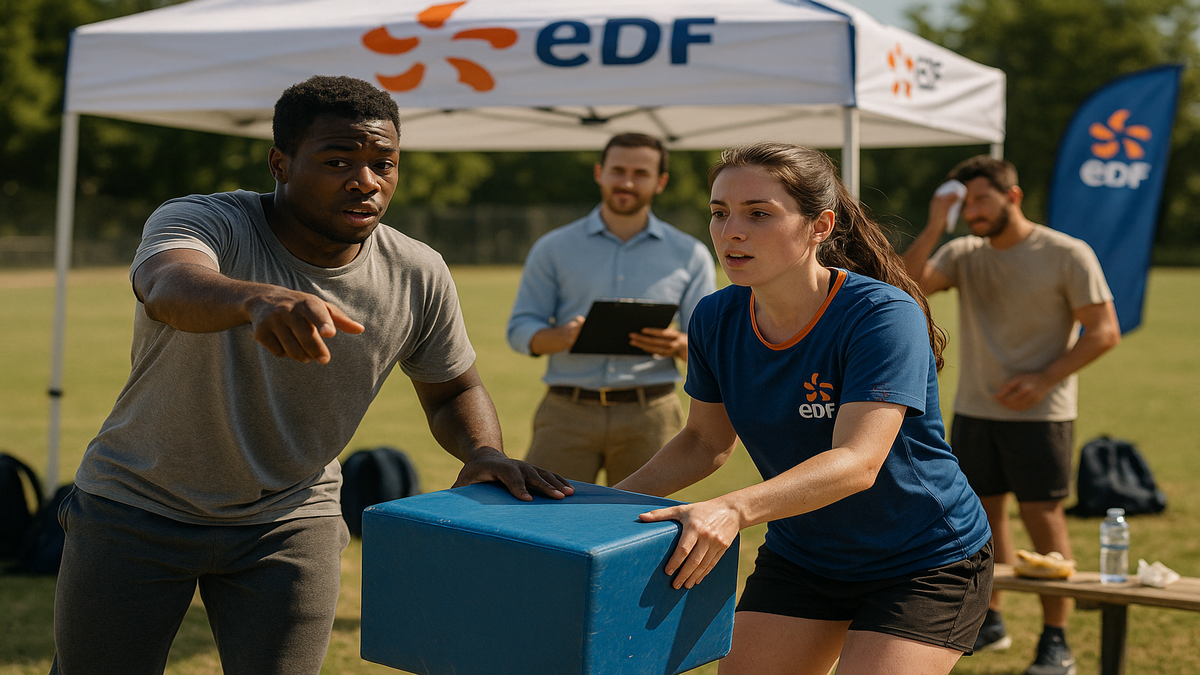The worlds of athletics and engineering don’t usually collide, but EDF — France’s leading energy provider — is reshaping that narrative. Recently, the group launched an unconventional recruitment initiative that prioritizes sports, not as leisure, but as a decisive tool for identifying workforce potential.
When character beats the CV
If you’re imagining a fast track to a job at EDF by scoring goals or shooting hoops, the reality is more nuanced — but just as compelling. Through its “Recrutement par le Sport” program, EDF is integrating sporting activities into their hiring approach. The aim? Spot hidden talents, far from traditional resumes and cover letters, by evaluating transferable soft skills on the field.
Sport, according to EDF, reveals attributes that don’t show up in a CV: resilience, coordination, adaptability, and decision-making under stress. These are crucial to succeed in many of EDF’s technical and operational roles. The company has turned this concept into action by organizing events that mix physical challenges with real-time recruitment interviews.
Designed for inclusion
The program emerged as a way to better reach populations that feel disconnected from the job market — especially youth from socio-economically disadvantaged backgrounds. Sporting challenges reduce the pressure typical of corporate interviews and allow candidates to shine in a more natural, less scripted environment.
EDF HR Manager Hélène Boulet summed it up in an interview:
“When someone gives their all during a relay run, pushes a teammate to the finish line, or keeps composure under pressure, we’re already learning about their teamwork and leadership. That’s data no résumé can give us.”
A channel for elite athletes
Beyond grassroots recruitment, EDF has carved out a path for elite athletes — those listed by France’s Agence Nationale du Sport. Twenty full-time positions have been earmarked uniquely for them. These athletes must meet EDF’s general hiring standards, but they’re given logistical support that allows for dual careers in both energy and sports.
During global competitions such as the Olympics or World Championships, these employees can devote up to 80% of their normal working hours to training and competition.
How it works
Blending competition and competency
The EDF recruitment events combine physical activities with direct corporate engagement. A candidate might start the day in a team sports tournament and end it in an informal sit-down with hiring managers — sweat and adrenaline included.
- Non-traditional application pathways
- Group challenges that test decision-making and collaboration
- On-the-spot feedback and coaching
- Contact with EDF technical staff and recruiters
These events are often hosted in partnership with sports federations and community centers in underrepresented regions — a deliberate choice, according to internal documents from EDF’s HR division.
Measurable impact
The numbers reveal more than a PR campaign. According to EDF’s official reports (edf.fr), 90% of the behavioral skills identified during their sports recruitment events have a direct correlation with job performance in fields like maintenance, nuclear safety, and customer relations.
| Metric | Value |
|---|---|
| Positions reserved for elite athletes | 20 per year |
| Max time off for competition | 80% of working hours |
| % of useful soft skills identified via sport | 90% |
| Programs launched in working-class areas | More than 12 since launch |
Corporate match point?
EDF’s approach contrasts starkly with its more orthodox recruitment methods: online applications, formal tests, and traditional interviews. By recruiting through sport, the company hopes to future-proof its workforce while also increasing social diversity in technical fields — where shortages are persistent.
Other parts of the EDF group like EDF Energy UK continue traditional pipelines like apprenticeships and internships. But in France, pilot programs through sport hint at a deeper cultural reinvention inside the company.
FAQ
How does EDF identify the right candidates through sports?
EDF evaluates candidates during physical activities, using observation grids focused on soft skills such as leadership, adaptability, and stress management. These are reviewed by both recruiters and technical staff, providing a multidimensional assessment outside traditional interviews.
What specific sports does EDF use for recruitment?
The company uses team-based sports like soccer, relay races, rowing challenges, and coordinated physical games. The emphasis is on the social and cognitive dynamics they stimulate, more than athletic performance alone.
Are there any success stories from EDF’s sports-based recruitment?
Yes, EDF’s Community Rowing Challenge, initially run alongside the London Olympics, helped guide 40 young adults into training paths. Several participants have since joined the company or pursued technical trades.
How does the sports-based recruitment process differ from traditional methods?
Unlike traditional CV- and degree-based filtering, this approach relies on behavioral assessments in real-world contexts. It provides chances to candidates who might lack qualifications but have strong personal drive and aptitude for teamwork.
What kind of roles are available for candidates recruited through sports?
Mainly roles in operations, maintenance, customer service, and ground-level technical work. For elite athletes, there’s a broader range depending on their qualifications, including positions in engineering and administration.



